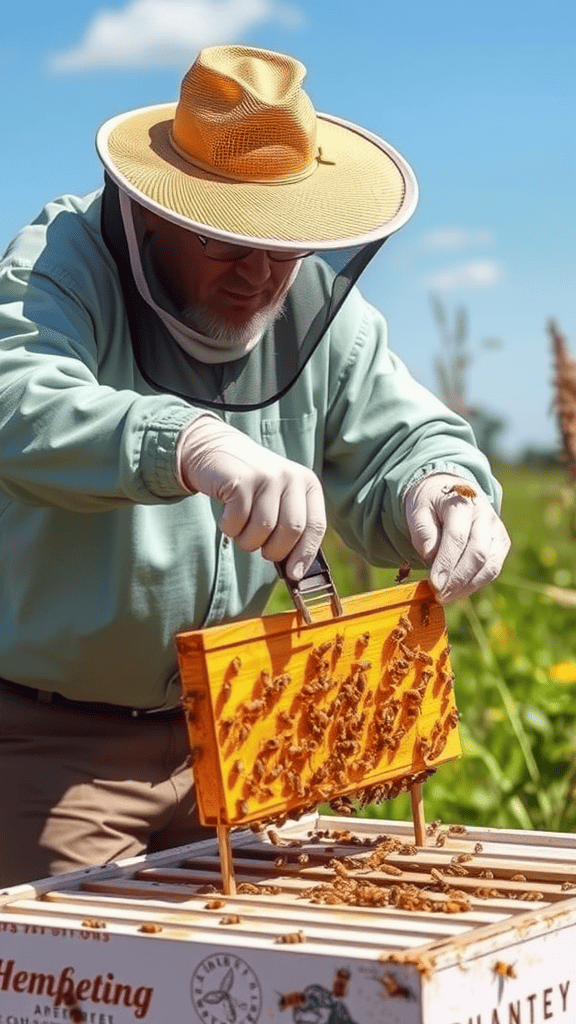Essential Steps to Start Beekeeping in Florida
If you’re considering taking up beekeeping in Florida, you’re in for an exciting journey! Beekeeping not only helps the environment, but it can also provide you with fresh honey and beeswax. Follow these essential steps to get started on your beekeeping adventure.
Understand Local Regulations
Before diving into beekeeping, familiarize yourself with local laws and regulations concerning beekeeping in your area. In Florida, regulations can differ from county to county. Check with your local government or agriculture department to understand any permits you might need. Participating in local beekeeping associations can also keep you informed about regulations and best practices.
Choose the Right Location
Finding the right location for your bee hives is crucial. Here’s what to consider:
- Sunlight: Hives should receive sunlight for at least six hours a day.
- Water Source: Bees need water for various activities; ideally, have a water source nearby.
- Protection from Wind: Place hives in a sheltered area to protect against harsh winds.
- Distance from Neighbors: Keep a good distance from neighbors to avoid complaints.
Select Your Beekeeping Equipment
No beekeeping journey can begin without the right equipment. Here’s the basic gear you’ll need:
- Beehive: Purchase a complete hive or components like frames and supers based on your preference.
- Protective Clothing: Invest in a bee suit, gloves, and a veil to protect yourself from stings.
- Smoker: A smoker calms the bees, making it easier for you to work with them.
- Hive Tool: This tool helps you manage frames and hives effectively.
- Bee Brush: A soft brush will help you gently move bees without harming them.
Choose Your Bees
Next, you have to select the type of bees you want to keep. Some popular options in Florida include:
- Italian Bees: Known for their gentle nature and good honey production.
- Carniolan Bees: Great for warmer climates, these bees are hardy and produce honey well.
- Russian Bees: Adapted to colder climates but can perform well in Florida.
You can get bees from local suppliers or other beekeepers. Make sure they’re healthy and free from disease.
Learn Basic Beekeeping Techniques
Understanding basic beekeeping techniques will help ensure your bees thrive. Here are a few key skills to develop:
- Inspecting Hives: Regular inspections can help you monitor bee health and check for pests.
- Harvesting Honey: Learn the proper method to extract honey without harming the bees.
- Feeding Bees: During times of scarcity, know how and when to supplement your bees’ diet.
Consider taking a local class or online course to enhance your knowledge.
Join a Beekeeping Community
Joining a local beekeeping club can provide support and resources to help you succeed. You’ll get a chance to meet experienced beekeepers, learn from their experiences, and participate in group events. Online forums and social media groups can also serve as excellent platforms for questions and support.
Continue Learning and Adapting
Beekeeping is a continuous learning experience. Stay updated with the latest beekeeping practices through books, online resources, and workshops. Research local plants that bloom throughout the year to ensure your bees have a constant food source.
Starting beekeeping in Florida is a rewarding endeavor that requires knowledge, patience, and commitment. By following these essential steps and continuously educating yourself, you will be well on your way to becoming a successful beekeeper. Enjoy the process and remember that each hive is unique, just like the journey of every beekeeper!
Understanding Florida’s Unique Beekeeping Regulations and Challenges
Beekeeping in Florida is an exciting venture, but it comes with unique regulations and challenges that every aspiring beekeeper should understand. Whether you’re a novice or an experienced apiarist looking to expand into the Sunshine State, knowing the local rules is crucial for successful beekeeping.
Florida has specific laws that govern beekeeping aimed at protecting the environment, the bee population, and public health. The Florida Department of Agriculture and Consumer Services (FDACS) oversees these regulations, which are designed to maintain healthy bee populations and reduce the risk of pests and diseases. Understanding these rules will help you prevent legal issues and promote responsible beekeeping practices.
One of the first steps is to register your beehive. In Florida, beekeepers must notify the FDACS of their hives. This regulation helps track bee populations and manage the spread of diseases. You should also be aware that some counties may have local ordinances regarding beekeeping. Always check with your county’s agricultural office to confirm any additional requirements or restrictions.
Some important regulations include:
- All beekeepers are required to keep their hives in a sanitary condition.
- Beekeepers must take measures to prevent swarming, which can lead to bee population issues in the area.
- Hives must be inspected regularly for pests and diseases, in compliance with state laws.
- Non-commercial operations must be managed with a focus on maintaining good neighbor relations to avoid complaints.
Alongside regulatory requirements, Florida’s climate poses unique challenges for beekeepers. While the warm temperatures are generally beneficial for bee activity, they also bring challenges such as heat stress, pests, and the prevalence of certain diseases. The state is home to various pests like the Varroa mite and small hive beetle, which can be detrimental to bee health.
During the hot summer months in Florida, bee colonies might require more attention. Beekeepers should ensure that their hives have enough ventilation and access to water. You may consider placing a shallow pan with pebbles filled with water near your hives. This provides bees with a safe drinking source without the risk of drowning.
Florida’s diverse flora is both a blessing and a challenge. From citrus blossoms to wildflowers, the variety of available pollen sources can promote strong colonies. However, this diversity also means that beekeepers need to be aware of potential plant-related issues. Some plants, like the Brazilian pepper tree, can be harmful to bees. Research local flora and determine which types are beneficial and which should be avoided.
Additionally, understanding the blooming cycles of native plants is essential for planning the health and productivity of your hives. Keeping a detailed log of flowering patterns can help you anticipate periods of abundance and scarcity for nectar and pollen sources.
In Florida, you should also prepare for hurricanes and storms. As a beekeeper, proactive measures are vital in protecting your hives from extreme weather. Make sure to secure your hives and have a contingency plan in place for moving them if needed. This planning will help preserve your bees during hurricane season.
Getting involved in local beekeeping associations can provide invaluable support and resources. These groups often offer educational workshops, mentorship opportunities, and access to local experts who can provide firsthand experience. Joining these communities can also connect you with fellow beekeepers facing similar challenges.
Understanding Florida’s unique beekeeping regulations and challenges is essential for anyone looking to start or expand their beekeeping journey in the state. By adhering to state laws, staying aware of local ordinances, implementing measures to combat pests, and engaging with the community, you can build a successful beekeeping operation. Above all, continuous education and adaptability will ensure your beehives thrive in Florida’s vibrant yet challenging environment.
Conclusion
Starting your beekeeping journey in Florida can be both rewarding and fulfilling. By following the essential steps laid out, you can lay a strong foundation for your apiary. It’s crucial to gain knowledge about local bee species, climate considerations, and the seasonal cycles of beekeeping in the Sunshine State. Becoming familiar with the types of flowers and plants that bloom in your area will also be beneficial to your bees’ foraging efforts.
Understanding Florida’s unique regulations is equally important. The Florida Department of Agriculture and Consumer Services (FDACS) has specific guidelines to protect both beekeepers and the environment. You’ll need to register your hives, which helps in monitoring bee health and managing disease control effectively. Be mindful of any local zoning laws that might affect your hives, as these regulations can vary significantly across different counties.
Every new venture comes with its challenges, and beekeeping is no different. Florida’s warm climate may lead to issues such as pests and diseases, notably Varroa mites and small hive beetles. Being proactive by regularly inspecting your hives and maintaining proper bee health can make a difference.
As you embark on this journey, surround yourself with a supportive community. Join local beekeeping associations or online forums to connect with fellow enthusiasts who can share insights and advice. Remember, patience and persistence are key in beekeeping. Embrace the learning curve, and soon you’ll find yourself not just keeping bees, but truly collaborating with them in a harmonious relationship that benefits both you and these vital pollinators.
As an Amazon Associate, I earn from qualifying purchases.

